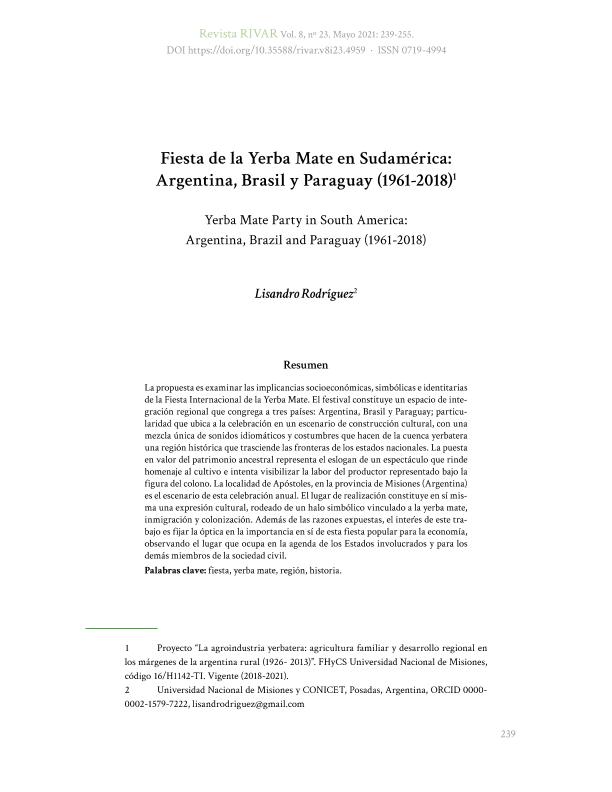Mostrar el registro sencillo del ítem
dc.contributor.author
Rodríguez, Lisandro Ramon

dc.date.available
2021-09-13T18:54:13Z
dc.date.issued
2021-05
dc.identifier.citation
Rodríguez, Lisandro Ramon; Fiesta de la Yerba Mate en Sudamérica: Argentina, Brasil y Paraguay (1961-2018); Universidad de Santiago de Chile. Instituto de Estudios Avanzados; RIVAR; 8; 23; 5-2021; 239-255
dc.identifier.issn
0719-4994
dc.identifier.uri
http://hdl.handle.net/11336/140256
dc.description.abstract
La propuesta es examinar las implicancias socioeconómicas, simbólicas e identitarias de la Fiesta Internacional de la Yerba Mate. El festival constituye un espacio de integración regional que congrega a tres países: Argentina, Brasil y Paraguay; particularidad que ubica a la celebración en un escenario de construcción cultural, con una mezcla única de sonidos idiomáticos y costumbres que hacen de la cuenca yerbatera una región histórica que trasciende las fronteras de los estados nacionales. La puesta en valor del patrimonio ancestral representa el eslogan de un espectáculo que rinde homenaje al cultivo e intenta visibilizar la labor del productor representado bajo la figura del colono. La localidad de Apóstoles, en la provincia de Misiones (Argentina) es el escenario de esta celebración anual. El lugar de realización constituye en sí misma una expresión cultural, rodeado de un halo simbólico vinculado a la yerba mate, inmigración y colonización. Además de las razones expuestas, el interés de este trabajo es fijar la óptica en la importancia en sí de esta fiesta popular para la economía, observando el lugar que ocupa en la agenda de los Estados involucrados y para los demás miembros de la sociedad civil.
dc.description.abstract
The proposal is to examine the socio-economic, symbolic and identity implications of the International Yerba Mate Party. The festival constitutes a space for regional integration by bringing together three countries: Argentina, Brazil and Paraguay; particularity that locates the celebration in a setting of cultural construction, with a unique mix of idiomatic sounds and customs that make the yerbatera basin a historical region that transcends the borders of national states. The enhancement of the ancestral heritage represents the slogan of the show that pays homage to the crop and tries to make visible the work of the producer represented under the figure of the settler. The town of Apóstoles in the province of Misiones (Argentina) is the scene of this annual celebration. The place of performance constitutes in itself a cultural expression surrounded by a symbolic halo linked to yerba mate, immigration and colonization. In addition to the reasons given, the interest of this work is to focus on the importance of this popular festival for the economy, noting the place it occupies on the agenda of the States involved and other members of civil society.
dc.format
application/pdf
dc.language.iso
spa
dc.publisher
Universidad de Santiago de Chile. Instituto de Estudios Avanzados
dc.rights
info:eu-repo/semantics/openAccess
dc.rights.uri
https://creativecommons.org/licenses/by/2.5/ar/
dc.subject
YERBA MATE
dc.subject
FIESTA
dc.subject
SUDAMERICA
dc.subject
REGION
dc.subject
HISTORIA
dc.subject.classification
Ciencias Sociales Interdisciplinarias

dc.subject.classification
Otras Ciencias Sociales

dc.subject.classification
CIENCIAS SOCIALES

dc.title
Fiesta de la Yerba Mate en Sudamérica: Argentina, Brasil y Paraguay (1961-2018)
dc.title
Yerba Mate Party in South America: Argentina, Brazil and Paraguay (1961-2018)
dc.type
info:eu-repo/semantics/article
dc.type
info:ar-repo/semantics/artículo
dc.type
info:eu-repo/semantics/publishedVersion
dc.date.updated
2021-07-30T18:51:34Z
dc.journal.volume
8
dc.journal.number
23
dc.journal.pagination
239-255
dc.journal.pais
Chile

dc.journal.ciudad
Santiago de Chile
dc.description.fil
Fil: Rodríguez, Lisandro Ramon. Universidad Nacional de Misiones. Facultad de Humanidades y Ciencias Sociales. Secretaría de Investigación y Postgrado; Argentina. Consejo Nacional de Investigaciones Científicas y Técnicas. Centro Científico Tecnológico Conicet - Nordeste; Argentina
dc.journal.title
RIVAR
dc.relation.alternativeid
info:eu-repo/semantics/altIdentifier/doi/https://doi.org/10.35588/rivar.v8i23.4959
dc.relation.alternativeid
info:eu-repo/semantics/altIdentifier/url/https://www.revistas.usach.cl/ojs/index.php/rivar/article/view/4959
Archivos asociados
